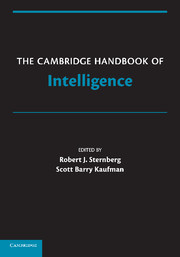Book contents
- The Cambridge Handbook of Intelligence
- The Cambridge Handbook of Intelligence
- Copyright page
- Dedication
- Contents
- Contributors
- Preface
- Part I Intelligence and Its Measurement
- Part II Development of Intelligence
- Chapter 5 Intelligence
- Chapter 6 Developing Intelligence through Instruction
- Chapter 7 Intelligence in Infancy
- Chapter 8 Intelligence in Childhood
- Chapter 9 Intelligence in Adulthood
- Part III Intelligence and Group Differences
- Part IV Biology of Intelligence
- Part V Intelligence and Information Processing
- Part VI Kinds of Intelligence
- Part VII Intelligence and Society
- Part VIII Intelligence in Relation to Allied Constructs
- Part IX Moving Forward
- Author Index
- Subject Index
Chapter 6 - Developing Intelligence through Instruction
from Part II - Development of Intelligence
Published online by Cambridge University Press: 05 June 2012
- The Cambridge Handbook of Intelligence
- The Cambridge Handbook of Intelligence
- Copyright page
- Dedication
- Contents
- Contributors
- Preface
- Part I Intelligence and Its Measurement
- Part II Development of Intelligence
- Chapter 5 Intelligence
- Chapter 6 Developing Intelligence through Instruction
- Chapter 7 Intelligence in Infancy
- Chapter 8 Intelligence in Childhood
- Chapter 9 Intelligence in Adulthood
- Part III Intelligence and Group Differences
- Part IV Biology of Intelligence
- Part V Intelligence and Information Processing
- Part VI Kinds of Intelligence
- Part VII Intelligence and Society
- Part VIII Intelligence in Relation to Allied Constructs
- Part IX Moving Forward
- Author Index
- Subject Index
Summary
- Type
- Chapter
- Information
- The Cambridge Handbook of Intelligence , pp. 107 - 129Publisher: Cambridge University PressPrint publication year: 2011
- 4
- Cited by

